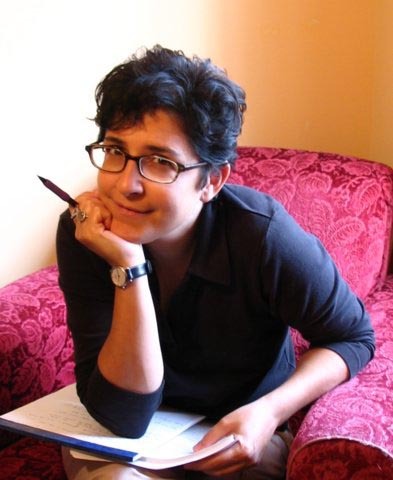Allison K. Williams's Blog, page 93
January 24, 2022
What We’re Looking For: Michael Steinberg Essay Prizes
 Mary Cappello, Steinberg Essay Prize Judge
Mary Cappello, Steinberg Essay Prize JudgeFrom Patrick Madden and Joey Franklin
This winter marks the third Michael Steinberg Memorial Essay Prize , since it was named in honor of Fourth Genre’s founding editor, who died at the end of 2019. It’s also our third year as editors, and the second year we’re also holding a Multimedia Essay Contest. All this has us taking stock of the curious responsibility that falls every year, not only to our guest judges, but also to us as editors. Looki...
January 21, 2022
On Structure and the Lyric Essay

In our new issue’s Craft Essay section, Australian poet Lesh Karan discusses how she had “pretty much given up on prose,” until she met the lyric essay.
It was as if I found myself a new lover. I was on a cloud-nine high: I didn’t have to write a tightly knitted argument required of a critical essay. I could loosely stitch fragments—even seemingly unrelated ones. I could leave gaps. Lean on poetic devices such as lyricism and metaphor. Let juxtaposition do the talking. I did not need to k...
January 20, 2022
Queering the Fragment

In the Craft Section of our newest issue, Emilio Williams offers his uniquely-constructed essay “Inside the Box: On Queering the Fragment,” using Barthes, Sontag, and writers such as Wilde, Stein, Proust, Kazim Ali, Maggie Nelson, and Carmen Maria Machado to explore the “mysterious craft [and] magical physics” of queer texts.
From Sappho’s fragments to the graffiti of male-staffed brothels in
Pompeii, the earliest queer texts have reached us in snippets. For centuries, the only
possible...
January 19, 2022
On Meg Tilly, Early Trauma and the Rise of the Fragmented Memoir

In our Craft Section this month, Sonja Livingston explores the link between trauma and fragmented memoirs, and that unlikeliest of literary pioneers, Agnes of God * :
I have fallen for a thirty-year-old memoir.
That fact that a memoir snagged me isn’t surprising. For all the genre’s pitfalls—the dogged self-reference, unmitigated earnestness and occasional fibbery—when a story is both well-told and true, its power is unparalleled. A good memoir can magnify silenced voices, shed light on o...
January 18, 2022
Brevity’s January 2022 Issue Available Now

We had to chip away at the ice to make it happen, but our newest issue is live, featuring exceptional flash essays from Beth Kephart, Kerry Neville, Aracelis González Asendorf, B.J. Hollars, Grace Bauer, Sarah M. Wells, Keema Waterfield, Caitlin Scarano, Deb Werrlein, Troy Pancake, Hannah Grieco, and Nels P. Highberg.
Also, three useful and brilliant craft essays: Sonja Livingston reflects on trauma and the writing of actress Meg Tilly, Emilio Williams offers “Queering the Fragment,” and ...
January 17, 2022
Memoirists: Worried Your Story “Isn’t Interesting Enough”?

You have a memoir idea, maybe even a first draft, have poured your heart and soul into the project yet the insecure voice that asks “Who will even care?” refuses to quiet itself. When you read what you have on the page, the emotions swell up in your own heart, but you wonder if the words will come alive this same way for a reader.
These are basic concerns facing all writers of memoir. Though our stories – the truth of our pain, our struggles, our progress, our redemption – reverberate on ...
January 14, 2022
A Review of Kathy Biehl’s Eat, Drink, and Be Wary

By Keema Waterfield
Twenty-one months into pandemic parenthood, the thing I most often pine for (after a vaccine for my toddler) is a mail-order intravenous food option for my entire household.
My youngest child was eighteen months old when we first locked down. He’d just recently been assessed by an oral therapist, because he grew so tired while chewing that he’d pocket his food in his cheeks like a squirrel, only to choke on it later. This was when I pre-chewed his food for him like ...
January 13, 2022
Seven Reasons for Rejection

For editors, rejection is often a gut-level process: they’ve edited this journal for 5, 10, 15 years; they know instinctively if a piece doesn’t fit. For writers, rejection sucks. No matter how much we know that rejection is not feedback, we take it to heart. Question our worth. Wonder if we’ll ever write anything publishable. Rejection’s sting is the price we pay for the occasional, glorious feeling of acceptance—that we can’t predict or control.
But we can control our work. Often, a pi...
January 12, 2022
Writing the Story of a Marriage

By Nancy McCabe
When I set out to write about my ill-advised, ill-fated youthful marriage, I didn’t realize what an almost impossibly daunting task was ahead of me. I didn’t realize that opinions about my life would feel inextricable from opinions about the writing. That judgments about the characters would feel inseparable from judgments about me. That proceeding would require a mix of steely determination and foolish tenacity.
Even before my wedding at 20, I was writing in coded ...
January 11, 2022
She Flees to Structure: A Screenwriter’s Refuge when Writing Prose
by M. Tamara Cutler

I’m printing draft six of a “based on a true story” screenplay and wrapping my head around notes from my producers for an act three rewrite. It sounds daunting, but third act problems are usually the result of hidden flaws in act one. Now that everyone is happy with the first eighty-five pages of the script, the final thirty should be easily resolved.
My story with this script began in 2016. I read a ‘where are they now’ article in the New York Times written by Susa...



